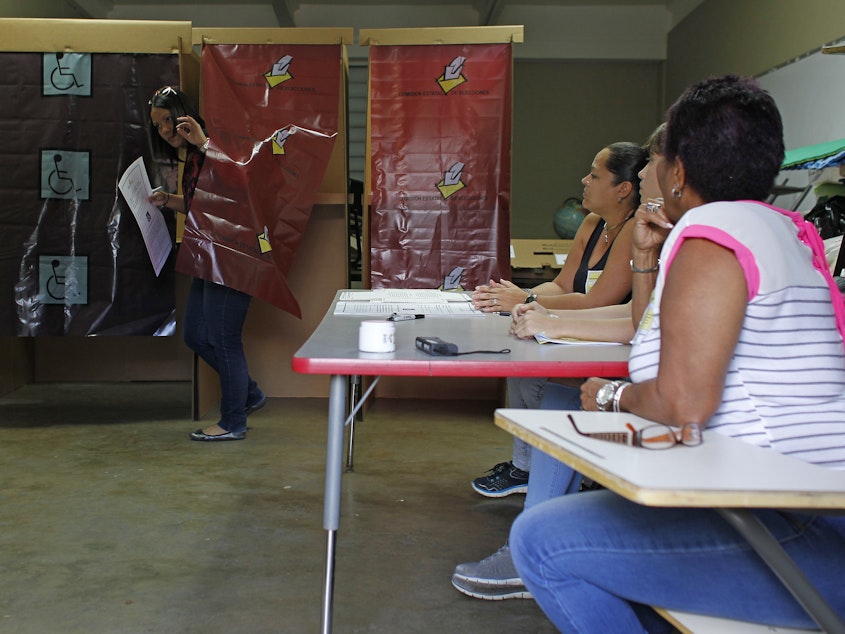Puerto Rico's Internet Voting Plan Threatens Election Security: ACLU

Puerto Ricans could be casting their ballots online only in the next eight years, according to a bill that is expected to pass this week.
Civil liberties advocates are ringing alarm bells over this plan to shift voting online, warning that the move threatens election security and voting rights.
The American Civil Liberties Union and its Puerto Rico chapter urged the island's governor, Wanda Vázquez, to veto a bill containing the Internet voting plan.
"There is no secure way to hold elections online," they wrote in a letter to the governor on Wednesday.
"This measure is misguided, dangerous, and will needlessly expose Puerto Rico's voting system to hacking and disruption." The ACLU said "such disruption will only result in greater public mistrust of key democratic institutions."
Sponsored
The online voting plan is part of a bill to reform the U.S. territory's electoral code. The bill is expected to be approved by the legislature by the end of this week.
The measure calls for Puerto Rico's electoral commission to create an Internet voting program that could overhaul the way all the island's citizens cast their ballots within eight years.
The plan starts with a pilot project to let voters who are eligible vote early or absentee to cast their ballots over the Internet in this November's general election. The second phase expands the option to vote online to all voters in the 2024 election.
In 2028, the electoral commission will decide whether online voting would be the only method of casting a ballot.
The bill does not include details about how online voting would be conducted or what security would be required.
Sponsored
The debate over Internet voting pits the desire to expand access against fears over security. Advocates of online voting argue that using technology to make voting as simple as a tap on a smartphone screen can boost turnout. Opponents say it raises too many risks that votes will be hacked or otherwise interfered with, effectively disenfranchising people.
The text of Puerto Rico's bill says letting people vote over the Internet would make voting easier and more accessible. The bill was introduced by Thomas Rivera Schatz, the president of Puerto Rico's senate. He did not respond to requests for comment.
The ACLU says the plan raises the risk of election interference, threatening fundamental rights.
"The right to vote isn't just the right to cast a ballot, but also to have your vote count," said Mayte Bayolo, legislative attorney for the ACLU of Puerto Rico.
"Our concern is not only that the voting rights of the Puerto Rican population will run the risk of being tampered with, but also that they won't necessarily know that their vote counted."
Sponsored
The ACLU is also concerned that Puerto Rico's electrical infrastructure, which has been badly damaged by 2017's Hurricane Maria and recent earthquakes, cannot support the voting plan.
"Internet voting and online technology depends on electricity," Bayolo said.
Other U.S. states and counties have experimented with voting using smartphone apps and other online methods — although none as sweeping as Puerto Rico's proposal.
Most security experts oppose online voting proposals, saying the technology does not exist to ensure votes cast by Internet can be kept secure.
"Unfortunately, as convenient as it would be to just cast our votes online, the technology isn't there to do it safely," said Alex Halderman, a computer science professor at the University of Michigan who studies election security. He is contributing a statement laying out security concerns to the ACLU's campaign against Puerto Rico's plan.
Sponsored
Securing Internet votes requires protecting election servers from nation-state hackers, protecting voters' smartphones and computers, and securely verifying voters' identities, Halderman said.
Those challenges are particularly difficult in elections, where ballots must be kept secret and votes must be tallied correctly.
He pointed to the 2016 election, when Russians used cyberattacks to target voting infrastructure and presidential campaigns.
"It should be just common sense that we want to keep ballots as far away from the Internet as we can," he said. [Copyright 2020 NPR]

